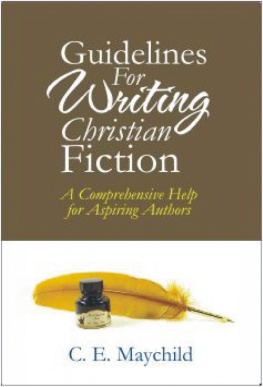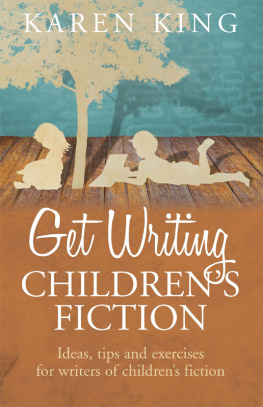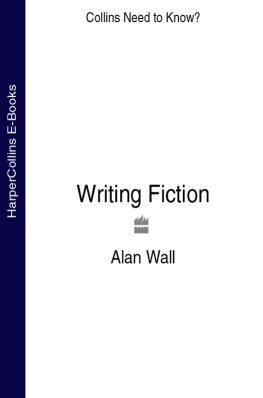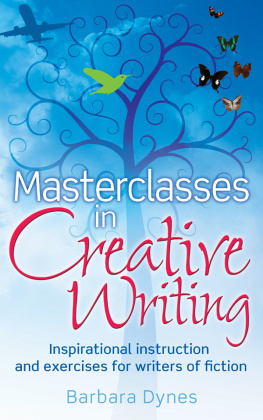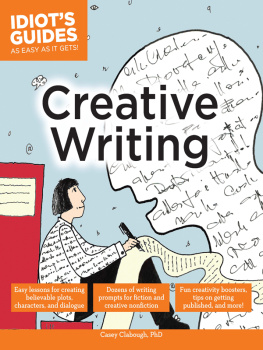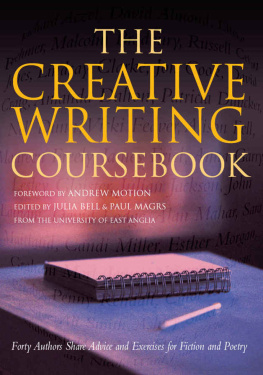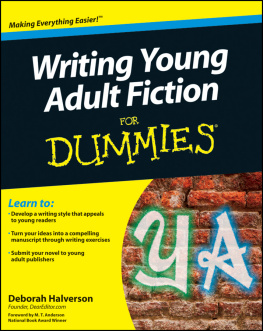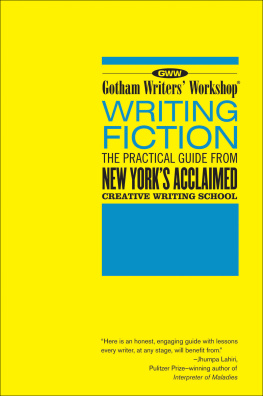Guidelines for WritingChristian Fiction:
A Comprehensive Helpfor Aspiring Authors
(SmashwordsEdition)
By
C. E. Maychild
Guidelines for WritingChristian Fiction
By C.E. Maychild
Copyright 2017 C. E.Maychild
Smashwords Edition
This ebook is licensedfor your personal enjoyment only. If you would like to share thisbook with another person, please purchase an additional copy foreach recipient. If youre reading this book and did not purchaseit, or it was not purchased for your use only, then kindly returnto your favourite ebook retailer and purchase your own copy. Thankyou for respecting the hard work of this author.
ISBN:978-13703-2603-7
All Scripturequotations are taken from the Holy Bible, King James Version unlessotherwise indicated.
All Scripturequotations marked NLT are taken from the Holy Bible, New LivingTranslation, copyright 1996, 2004, 2007 by Tyndale HouseFoundations. Used by permission of Tyndale House Publishers, Inc.,Carol Stream, Illinois 60188. All rights reserved.
All Scripturequotations marked GW are taken from the Holy Bible, Gods WordTranslation. Copyright 1995. Used by permission of WorldPublishing Inc., Grand Rapids. All rights reserved.
All Scripturequotations marked NIV are taken from the Holy Bible, NewInternational Versionniv. Copyright 1973, 1978, 1984, 2011 byBiblica, Inc. Used by permission of Biblica, Inc.. All rightsreserved worldwide. The NIV and New International Version aretrademarks registered in the United States Patent and TrademarkOffice by Biblica, Inc.
This book is alsoavailable in print at most online retailers.
Tableof Contents
To my parents, Celestine and Grace, the twopeople in this world who have taught me the most.
And, to all mystudents, past, present and future.
I want to seeChristian fiction speak to the hard and real issues that tearpeoples lives apart. We need writers who are willing to ask thehard questions and go through the soul-searching and agonizing tofind answersand present these stories with skill...
FRANCINE RIVERS
Introduction
This book is a product of theannual writing workshop which I have facilitated in the last coupleof years, Writing That Matters Christian Creative WritingWorkshop.
The workshopwhich gave birth to this first edition of Guidelines for WritingChristian Fiction: A Comprehensive Help for Aspiring Authorswas conceived with the objective of furnishing aspiring Christianfiction writers with creative writing techniques with which theycan better tell the stories that God has given them. It isimportant, I think, that this book has come out of a learningenvironment such as thisan environment where it was possible toobserve writers, both established and fledging, at their craft.For, I was able to identify, firsthand, some of the most commonpitfalls and challenges facing the majority of writers. To be ablealso to see how some of the ideas presented in this book werereceived and put into practice, and observe the outcome, was animmensely rewarding experience.
One of themost invaluable insight I gained from the annual workshops was theone that many aspiring Christian writers approach Christian fictionfrom a very secular and sometimes shallow standpoint. As appallingas this realization was, it was even more sobering for me. Therealization that, for a lot of hopeful Christian fiction writers,the underlying reason for aspiring to write is first their ownpersonally-motivated schemes and that the real import sometimesonly shows up belatedly, gave me a deeper purpose for writing thisbook. It convinced me of the bare necessity and timeliness ofit.
Hence, in PartOne of Guidelines for Writing Christian Fiction: A ComprehensiveHelp for Aspiring Authors, I have devoted the first fourchapters to discussing the subject of writing Christian fiction ingeneral: what it is and its place and import in carrying out theGreat Commission. I have also addressed the equipment of aChristian writer, what it means to be a Christian writer and thenotion that God does call people to write mere stories.
It is not allbad news, happily. I have found that the heart of the greaternumber of aspiring Christian fiction writers pulsates together intheir love for God and their genuine ambition to please theirMaster only. In fact, the majority of our workshop applicants overthe years have shown more zeal than skill. And, it is a good thing.The heart is where the worship begins and the fact is that writingfiction can be learned or perfected. It is to this end that thisbook is writtento help meld what is in the heart of aspiringChristian fiction writers with what is in their heads and, in theend, bring honor to God.
Therefore, inPart Two, readers are eased into the creative aspects of thewriting life. The creative chapters cover such subjects ascharacterization, creating memorable characters, choosing a pointof view, creating fictional places, handling conflict and dialogue,and developing a story. There are three whole chapters dedicated toplot and others covering everything you need to know about planningthe structure of a novel, researching for a novel, storytellingdevices and techniques, and grammar points. The final chapteraddresses some of your likely concerns once your novel is complete,including revising your work to meet the expectations of themarketplace and whether to consider a sequel or not.
Because thisbook came out of a real and interactive environment, you may noticethat it lacks any text-bookishness to it. Importantly, too, I havenot assumed that all my readers are complete novices. I have keptin mind the fact that this book will fall into the hands ofexperienced writers looking to make the switch from writing secularfiction to writing Christian fiction, writers who desire to learnor relearn the ropes in order to align their writing to sharingtheir faith. I also expect that established Christian fictionauthors will read this guide book as a refresher course. Therefore,I have styled it to be deliberately conversational and yetattempted to use lingo that does service to the expectedly diverseskill-level in a classroom-cum-writing workshop situation.
This book isdelineated into small units as much as possible. You may study theunits in whatever order works for you. Go back and forth until youmaster any problematic area of the craft, before moving on toanother.
Finally, thereare Reading Activities and Writing Exercises at the end of everylesson. The Reading Activities are mostly Bible-based readingscentered on an aspect of the lesson in view. They have beenincluded to help fix the import of each lesson more firmly in yourmind. They make for further independent and group study which,while focused primarily on an exposition of faith fundamentals,also address the mind to creative writing thoughts from Biblestandpoint. A few of the reading you will be encouraged to do willtake you to the classics where you can mingle with skillful wordsand enjoy a rub-off. The Writing Exercises, on the other hand, leanmore and more to creative writing even though, again, they arebased on the Bible as much as possible. They have been placed atthe end of the lessons to give you something to do, invariablydemanding that you do practice what you have just learned. TheWriting Exercises may be attempted individually or in smallworkshops or writing groups.
Because thisbook is designed as a guidebook, some of the more serious issues orblunders to look out for are highlighted and placed in a specialNo-No category. Watch out for these red flags signaling afairly serious trouble area that must be avoided. Yet, do not letthe dos and donts stop you dead. I recommend that you read thisbook all at once, or complete a topic you wish to study, and thatyou try not to write anything until you are done with it. I wantyou to be aware that you do not need to put in a lot of consciouseffort into remembering every guideline in this book, or any otherbook for that matter. Your beautiful God-designed mind has retainedsufficient of what you have read to move you to the next level inyour writing and this will pour out naturally. Pick up this bookfrom time to timejust before each rewrite or in between writingprojectsand run through it again to soak in more.

